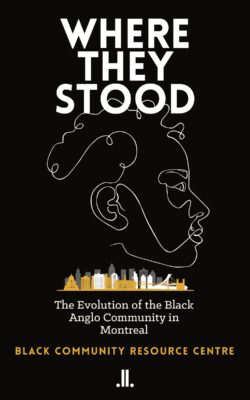When it comes to detailed accounts of Black history in Canada, the pickings are slim, and most are centred around violence and oppression. Montreal in particular has one of the richest Black histories in Canada, some of which can be found in publications by Black writers like Dorothy Williams and Mairuth Sarsfield, yet many ask: where is the rest?
Where They Stood Linda Leith Publishing
The Evolution of the Black Anglo Community in Montreal
The Black Community Resource Centre
$21.95
paper
220pp
9781773901343
As a genre with deep roots in Montreal, it comes to no surprise that discussions of jazz function as a through line in a book about Black resistance. Music has always been a vehicle for survival in the Black community. A convergence of love, joy, and grief, of life and death, it is, at its heart, the manifestation of Black resistance and community.
Perhaps the most remarkable essay that touches on the subject is “Growth and Innovation: Building a Black Cultural Mosaic in 1980s–90s Montreal” by Donna Fabiola Ingabire. While there are frequent mentions of prominent names like Rufus Rockhead and Oscar Peterson throughout the book, this is the only essay that mentions the lesser-known Rouè-Doudou Boicel, a Guyanese migrant who arrived in Montreal during the 1950s and opened multiple venues where jazz was the main attraction, hosting internationally known artists and organizing the first ever jazz festival in the city. This is a perfect example of how Black historical figures are omitted from history. As Amanda Asamani-Nyarko writes powerfully in her essay, “They Came, They Saw, They Wanted Change,” “whenever you walk the streets of Montreal, Black figures are hidden in the shadows.”
In what will surely be recognized as an indispensable educational tool and essential reading, Where They Stood illuminates the stories, roles, and efforts of generations of Black Canadians who thrived in a place where for decades, they were more than unwelcome. Reaching beyond histories of racism and enslavement, it emphasizes the importance of investing in Black joy and wellness, and of giving support not only during times of hardship. It asks us to visualize life outside of struggle, and preserves and inspires hope for current and future generations.mRb






0 Comments